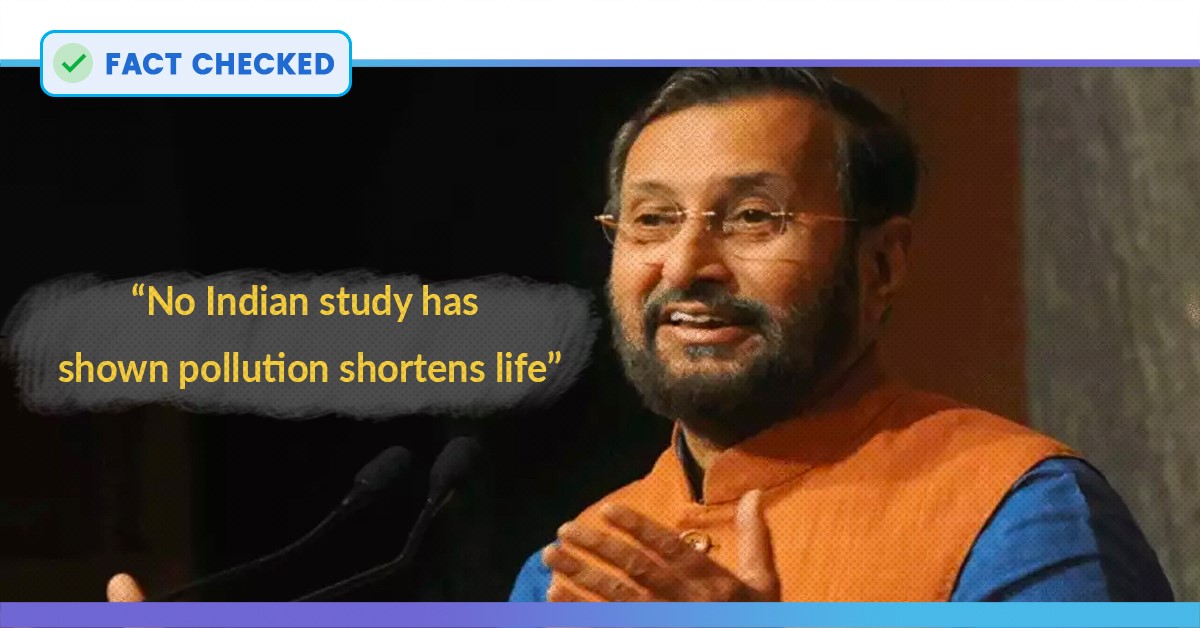Union Minister of Environment, Forest and Climate Change, Prakash Javadekar said on Friday said that no Indian study has shown a direct connection between air pollution and shortening of lifespan.
“Let us not create a fear psychosis among people,” Javadekar told during his Lok Sabha speech while responding to a query related decrease of life expectancy due to air pollution.
Referring to the studies which indicate that pollution reduces life expectancy, he even stated that such studies may not be based upon ‘first-generation data’.
The Minister was criticised heavily for making such a ludicrous statement.
Jaw-dropping statement from the environment minister in the world’s most air polluted country: No Indian Study Shows That Pollution Shortens Life: Environment Minister Prakash Javadekar https://t.co/qiD57flOzK
— Annie Gowen (@anniegowen) December 6, 2019
WHO to Javadekar: No study shows pollution spares Indians pic.twitter.com/NFWH2SofXk
— J.s (@Js87958738) December 9, 2019
This Guy Prakash Javedkar is not Fit to be Minister of Environment, Forest and Climate Change.Shame on him for making such Statements.
Saharsh Choudhary ಅವರಿಂದ ಈ ದಿನದಂದು ಪೋಸ್ಟ್ ಮಾಡಲಾಗಿದೆ ಶನಿವಾರ, ಡಿಸೆಂಬರ್ 7, 2019
WHO Director Public Health tweets reply to Union Minister Prakash Javdekar on air pollution issue.भाजपा मन्त्री संसार में भारत की नाक कटा रहे हैं, isn’t it sad?
Lovekesh Chandra ಅವರಿಂದ ಈ ದಿನದಂದು ಪೋಸ್ಟ್ ಮಾಡಲಾಗಿದೆ ಭಾನುವಾರ, ಡಿಸೆಂಬರ್ 8, 2019
Claim
No Indian study has shown that air pollution shortens life.
Fact Check
By saying that there is no Indian study which shows that there is any link between shortening of life expectancy and air pollution, Union Minister Prakash Javadekar contradicted the government’s own research.
A study funded by the Indian Council of Medical Research (ICMR) study, published on The Lancet is in contradiction to Prakash Javadekar’s statement. According to ICMR, life span of the people in India is going down as a result of air pollution.
“India has disproportionately high mortality and disease burden due to air pollution. This burden is generally highest in the low SDI (socio-demographic index) states of north India. Reducing the substantial avoidable deaths and disease burden from this major environmental risk is dependent on rapid deployment of effective multisectoral policies throughout India that are commensurate with the magnitude of air pollution in each state,” the study, published in The Lancet, had said.
This study is completely reliable because the initiative, which was taken by ICMR for this particular study, was approved by the Union Ministry of Health and Family Welfare. Also, this study had researchers and collaborators contributing for more than 50 reputed institutes famous for scientific researches. The report on pollution and life expectancy was released on December 6, 2018, by ICMR director-general Balram Bhargava in presence of senior officials of the health ministry.
Around 70,000 thousand international studies have been published linking pollution to heath, one such note worth one was published by Centre for Science and Environment (CSE).
According to this study, the life expectancy of Indians went down by almost 2.6 years because of the life-taking diseases caused because of air pollution.
The same report by the environment organisation Centre for Science and Environment (CSE) also revealed that household and outdoor air pollution together are the reason behind some deadly life taking diseases. “Air pollution is now the third-highest cause of death among all health risks ranking just above smoking in India. This is a combined effect of outdoor particulate matter (PM) 2.5, ozone and household air pollution.”
Not just Indian studies but international studies published by reputed organisations affirmed the correlation between air pollution and decline in life expectancy. Analysis based on the Air Quality Life Index (AQLI) developed by the Energy Policy Institute at the University of Chicago (EPIC) has shown that an average citizen living in the Indo-Gangetic Plain (IGP) region could lose about seven years of life expectancy because the air quality in the area failed to meet the World Health Organization’s (WHO) guideline for fine particulate pollution.

The World Health Organization has also said 90% of people are exposed to unsafe air, and breathing it in is killing 7 million people a year and harming billions more.
In October 2018, the WHO’s director-general told the Guardian that air pollution is the “new tobacco”. “Despite this epidemic of needless, preventable deaths and disability, a smog of complacency pervades the planet,” said Dr Tedros Adhanom Ghebreyesus.
World Health organisation’s official debunked the statement of Javadekar by saying that it wished air pollution “did not kill people but it unfortunately does”, The Times of India reported on Monday.
If you have any news that you believe needs to be fact-checked, please email us at [email protected]











